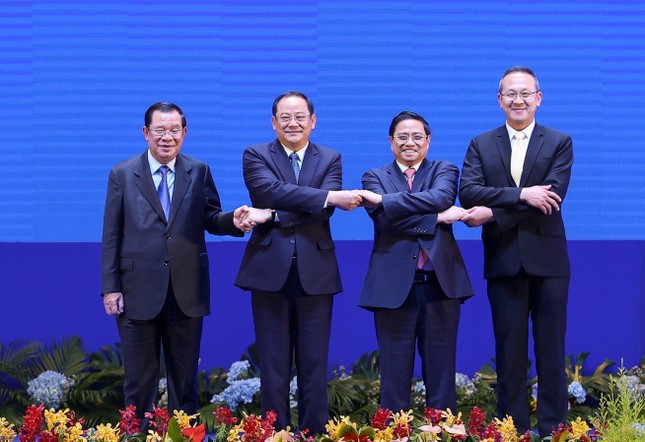
Leaders take a photo together at the Conference
On April 5, in Vientiane, Laos, the 4th Summit of the International Mekong River Commission adopted the Vientiane Joint Statement.
The Joint Statement further affirms the highest political commitment of the Heads of Governments of Cambodia, Laos, Thailand and Vietnam to the effective implementation of the 1995 Mekong Agreement and the role of the MRC as an agency. leading diplomacy and cooperation on water resources in the region.
At the same time, the MRC is a knowledge hub for enhanced implementation of strategies, procedures, technical guidelines, and the sharing of data and information across the basin, thereby promoting peaceful cooperation and mutually beneficial to achieve a shared vision of an economically prosperous, socially just, environmentally sound and climate-resilient Mekong River Basin.
The joint statement emphasized that although the development and use of the Mekong River's water resources contribute significantly to economic growth, it can also cause adverse impacts on the basin's environment and vulnerable communities. vulnerable, including transboundary impacts that need to be addressed collaboratively, especially when impacts are exacerbated by climate change.
To address the increasingly complex challenges of the basin, the Joint Declaration highlights the need for both management and development solutions to ensure environmental sustainability. In which, identify different investment solutions and adequately consider linkages between water-using sectors, supplement cross-border inter-reservoir operation management, especially timely data sharing. and often from mining works using water...
The Joint Declaration calls on the MRC and all its partners and stakeholders to work together to find innovative solutions to meet challenges, seize opportunities and strengthen cooperation for a better future. The Mekong River Delta is sustainable, ensuring water security, while adhering to the principles of openness, transparency, comprehensiveness, mutual benefit and equality.
Provide comprehensive solutions to climate change, including structural solutions, natural adaptation solutions; environmental limits, sediment management. At the same time, supporting the implementation of plans such as renewable energy production; connecting and upgrading the region's power transmission network, developing markets and commercial activities in energy...
Assist countries in helping communities adapt to river fluctuations by ensuring a seamless communication system for timely and effective notification of unusual fluctuations; water quality problems, floods and droughts, and other water-related emergencies. Maintain and seek new funding to support these efforts including public and private sources and global financial support mechanisms.